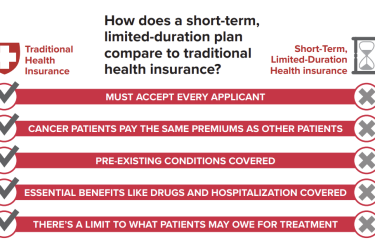
Early in June, the smart money was on the Senate’s Health Policy debate spilling into July. Majority Leader Mitch McConnell just didn’t have the votes. Moderates (not all of whom are all that “moderate” in general…) had deep misgivings about Medicaid spending, coverage losses and – for at least two moderate female senators – defunding of Planned Parenthood.
Conservatives wanted the repeal to cut more deeply into the Affordable Care Act and eliminate regulations and consumer protections, leaving states and the market to shape insurance coverage and affordability. McConnell didn’t have wiggle room. Even with Vice President Mike Pence as a tie-breaker, the majority leader needs 50 of the 52 Senate Republican votes on his side. If you were a senator who wanted something from him (and all of them do!) you had no incentive to cave yet. Everyone knew that June 30 wasn’t the “real” deadline. It’s really the end of July – before the long August recess.
Then the dynamic changed sharply. Around June 20 (give or take a day or two) McConnell began acting like the June 30 deadline was real, releasing a discussion draft of the bill on June 22. Senators became convinced he meant it and the pace of negotiations, bargaining, and dealing moved to warp speed: McConnell wanted it done.
Those of us who have watched the Senate for years – and usually have a pretty good sense of how things are going to turn out – saw that McConnell was determined. But we also saw the extraordinary difficulties. Many senators (both from the right and the center) thought the Better Care Reconciliation Act of 2017 legislation was both bad politics and bad policy. McConnell is one smart guy, an effective Senate leader who knows how to cut deals, push levers, and get things done. Yet we could not see how this bill could pass. But we also couldn’t see how it could not pass.
Fast forward to Tuesday, June 27. The CBO score had just come out, much worse than many senators had anticipated – with 22 million fewer people projected to be covered in a decade. Nevertheless, a procedural vote was expected – then punted until Wednesday. Then it all fell apart with extraordinary speed, for now. The votes were not there. Not even close.
What next? The Senate is going to try to rewrite the bill and aim to bring it to the floor soon after the July 4 break ends. Legislators return to D.C. around July 10 (possibly July 11). McConnell wants to move fast on a revised and re-scored bill. But legislators aren’t likely to move that quickly, so the drama will probably be closer to the end of the month. He is still in the same bind. If he moves to the right, he alienates moderates. If he moves to the center, he loses the right.
What next? None of us know and anyone who says they do probably does not. Remember, the House’s repeal-and-replace bill fell apart several times and received a terrible CBO score showing 23 million fewer people would be covered in a year. Still, it finally passed. The GOP has been promising repeal for years; the base still expects it, even if polls show they don’t like this particular bill.
The Republican-led Congress needs to get Health Policy done before it can move on to tax reform – and tax reform is more difficult if Congress doesn’t first get rid of some of the ACA’s taxes. So while Senate bill has now fallen apart, it’s not dead by any means. A revised version could still pass. Or not.
Here are some good reads on where things stand:
- The New York Times looks at the complicated politics of Health Policy.
- A great “tick-tock” from my Politico colleagues on how the bill fell apart.
- How McConnell may try to regroup, from the Washington Post.
- The AP captures Trump’s extraordinary comments (GOP lawmakers are making tough votes, and this is what he says?)
- A nice Q&A from NPR on what some of these sprawling changes would mean for ordinary people.
- Starting at 20:44 in this discussion, Mollyann Brodie of the Kaiser Family Foundation talks about the Trump voter and health care on a panel at the Aspen Ideas Festival Spotlight Health.
Earlier coverage:
- What the Senate health bill may mean for older adults
- Opposition forces GOP senators to delay ACA repeal-and-replace vote
- CBO releases score for Senate’s health care bill
- Services enabling disabled to live more mainstreamed life may fall prey to GOP reforms
- Senate plans quicker action than House on its health care reform bill
- Health plan execs fear Senate version of AHCA would gut Medicaid
- CBO: Health bill would leave 23 million more uninsured
- GOP health care bill passes House but there’s more to the story
- Despite ‘repeal and replace’ vow, Republicans pull health care bill before vote










